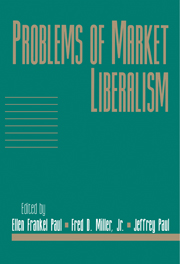Book contents
- Frontmatter
- Contents
- Introduction
- Acknowledgments
- Contributors
- Why All Welfare States (Including Laissez-Faire Ones) Are Unreasonable
- Measuring Opportunity: Toward a Contractarian Measure of Individual Interest
- Deontic Restrictions Are Not Agent-Relative Restrictions
- Why Even Egalitarians Should Favor Market Health Insurance
- Affirmative Action and the Demands of Justice
- The Dual Role of Property Rights in Protecting Broadcast Speech
- Regulation of Foods and Drugs and Libertarian Ideals: Perspectives of a Fellow-Traveler
- Profit: The Concept and Its Moral Features
- Natural Property Rights: Where They Fail
- Toward a Libertarian Theory of Class
- Libertarianism as if (the Other 99 Percent of) People Mattered
- On the Failure of Libertarianism to Capture the Popular Imagination
- Imitations of Libertarian Thought
- Index
Profit: The Concept and Its Moral Features
Published online by Cambridge University Press: 26 January 2010
- Frontmatter
- Contents
- Introduction
- Acknowledgments
- Contributors
- Why All Welfare States (Including Laissez-Faire Ones) Are Unreasonable
- Measuring Opportunity: Toward a Contractarian Measure of Individual Interest
- Deontic Restrictions Are Not Agent-Relative Restrictions
- Why Even Egalitarians Should Favor Market Health Insurance
- Affirmative Action and the Demands of Justice
- The Dual Role of Property Rights in Protecting Broadcast Speech
- Regulation of Foods and Drugs and Libertarian Ideals: Perspectives of a Fellow-Traveler
- Profit: The Concept and Its Moral Features
- Natural Property Rights: Where They Fail
- Toward a Libertarian Theory of Class
- Libertarianism as if (the Other 99 Percent of) People Mattered
- On the Failure of Libertarianism to Capture the Popular Imagination
- Imitations of Libertarian Thought
- Index
Summary
PROFIT AS AN ESSENTIALLY CONTESTED CONCEPT
Profit is a concept that both causes and manifests deep conflict and division. It is not merely that people disagree over whether it is good or bad. The very meaning of the concept and its role in competing theories necessitates the deepest possible disagreement; people cannot agree on what profit is. Still, simply learning the starkly different sentiments expressed about profit gives us some feel for the depth of the conflict. Friends of capitalism have praised profit as central to the achievement of prosperity and to civilized modern life. Calvin Coolidge, that silent sentinel of American business, said, “Profit and civilization go hand in hand.” F. A. Hayek tells us that
in the evolution of the structure of human activities, profitability works as a signal that guides selection towards what makes man more fruitful; only what is more profitable will, as a rule, nourish more people, for it sacrifices less than it adds.
Peter Drucker, a well-known management theorist, says that “profit is just another name for rationality.” On the other hand, socialists and related thinkers have excoriated profit with ferocity. Pierre-Joseph Proudhon is typical when he announces:
Products are bought only by products …. [P]rofit is impossible and unjust. Observe this elementary principle of economy and pauperism, luxury, oppression, vice, crime, and hunger will disappear from our midst.
Can Proudhon possibly be talking about the same thing as Coolidge, Hayek, and Drucker? As it turns out, no. They are referring to quite different things, and we will soon be able to see what and how. My concern, in this essay, is twofold.
- Type
- Chapter
- Information
- Problems of Market Liberalism , pp. 243 - 282Publisher: Cambridge University PressPrint publication year: 1998



